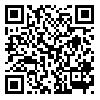Volume 22, Issue 66 (9-2022)
jgs 2022, 22(66): 145-158 |
Back to browse issues page
Download citation:
BibTeX | RIS | EndNote | Medlars | ProCite | Reference Manager | RefWorks
Send citation to:



BibTeX | RIS | EndNote | Medlars | ProCite | Reference Manager | RefWorks
Send citation to:
Ghasemi N, Alikhah Asl M, Rezvani M. (2022). Monitoring Land Cover Changes in Past 32 Years Using Remote Sensing Technique (Case Study: Pishva Town, Tehran). jgs. 22(66), 145-158. doi:10.52547/jgs.22.66.145
URL: http://jgs.khu.ac.ir/article-1-3513-en.html
URL: http://jgs.khu.ac.ir/article-1-3513-en.html
1- M.A student, Department of natural resources and environment, Payame Noor University (PNU), P.OBox 19395-4697, Tehran, Iran, M.A student, Department of natural resources and environment, Payame Noor University (PNU), P.OBox 19395-4697, Tehran, Iran
2- Assistant professor, Department of natural resources and environment, Payame Noor University (PNU), P.OBox 19395-4697, Tehran, Iran, Assistant professor, Department of natural resources and environment, Payame Noor University (PNU), P.OBox 19395-4697, Tehran, Iran ,alikhahasl@pnu.ac.irr
3- Associate Professor, Department of natural resources and environment, Payame Noor University (PNU), P.OBox 19395-4697, Tehran, Iran, Associate Professor, Department of natural resources and environment, Payame Noor University (PNU), P.OBox 19395-4697, Tehran, Iran
2- Assistant professor, Department of natural resources and environment, Payame Noor University (PNU), P.OBox 19395-4697, Tehran, Iran, Assistant professor, Department of natural resources and environment, Payame Noor University (PNU), P.OBox 19395-4697, Tehran, Iran ,
3- Associate Professor, Department of natural resources and environment, Payame Noor University (PNU), P.OBox 19395-4697, Tehran, Iran, Associate Professor, Department of natural resources and environment, Payame Noor University (PNU), P.OBox 19395-4697, Tehran, Iran
Abstract: (7893 Views)
Study of resources changes in previous years could be useful in the planning and optimal using of resources to control inappropriate changes. Because land use changes occur on large-scale, remote sensing technique is a useful and valuable tool for monitoring the changes. The aim of this research is land cover changes detection in a period of 32 years in Pishva town with using remote sensing technique .First TM, ETM and OLI images for the years 1986, 2002 and 2018 were collected respectively and after geometric and radiometric corrections, images were classified by using maximum likelihood classification methods. Kappa and overall indexes were used to calculate classification accuracy. Results showed in past 32 years, bare land and irrigated land have decreased while residential and greenhouse areas have increased. Classification accuracy showed that OLI, ETM and TM sensors have high accuracy respectively with kappa 0.96, 0.80 and 0.76 and also overall indexes of 97.56, 86.54 and 86 percent. Based on results, in the first period (1986-2002) 27.6%, in the second period (2002-2018) 29.60% and in the third period (1986-2018) 31.8% of area land cover have been changed. Results showed land cover changes in the area is related to climate changes like low precipitation, drought and social condition like population and food need increasing and economic condition like high production and efficiency.
Type of Study: Research |
Send email to the article author
| Rights and permissions | |
 |
This work is licensed under a Creative Commons Attribution-NonCommercial 4.0 International License. |

This work is licensed under a Creative Commons — Attribution-NonCommercial 4.0 International (CC BY-NC 4.0)






